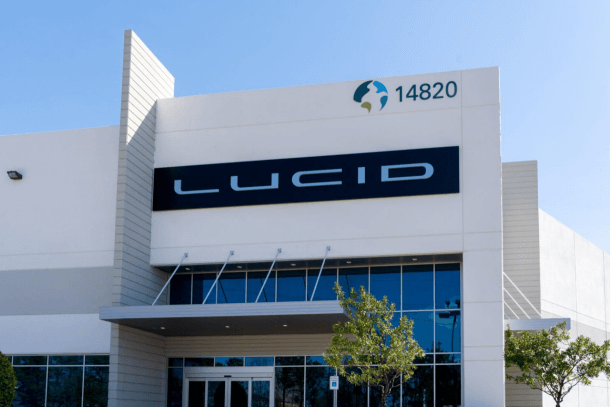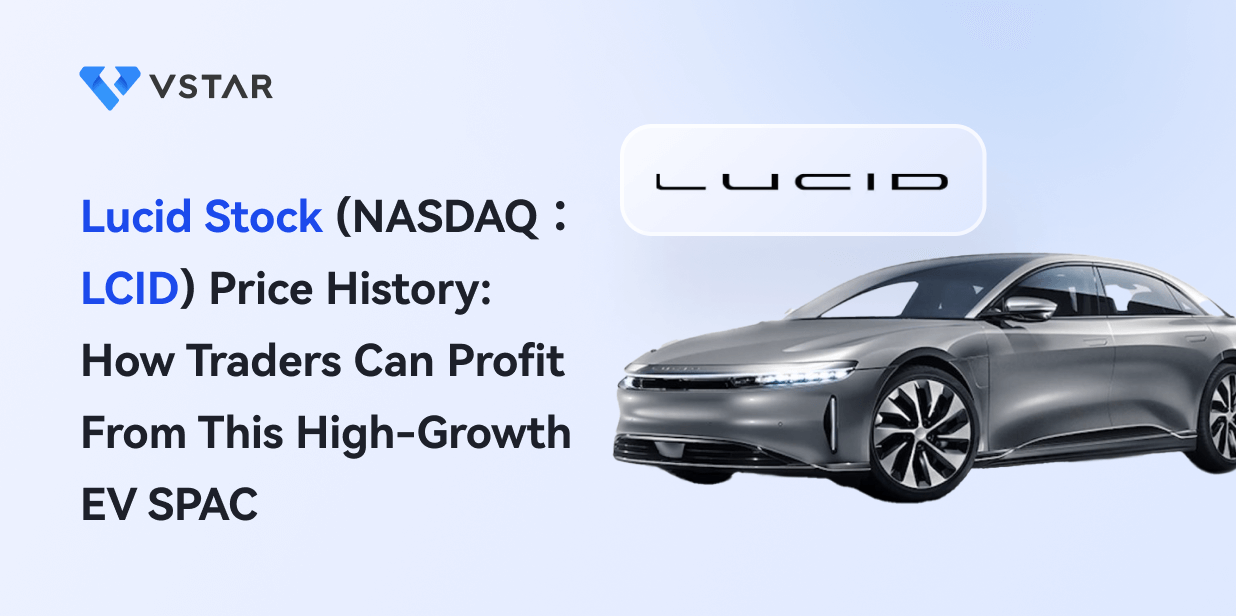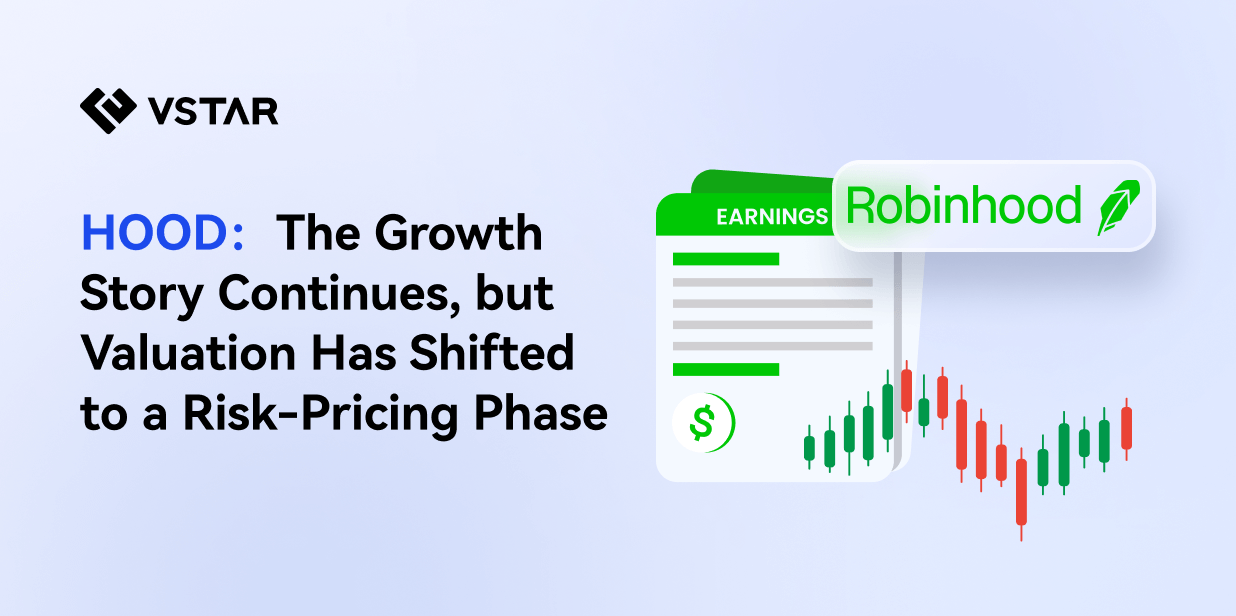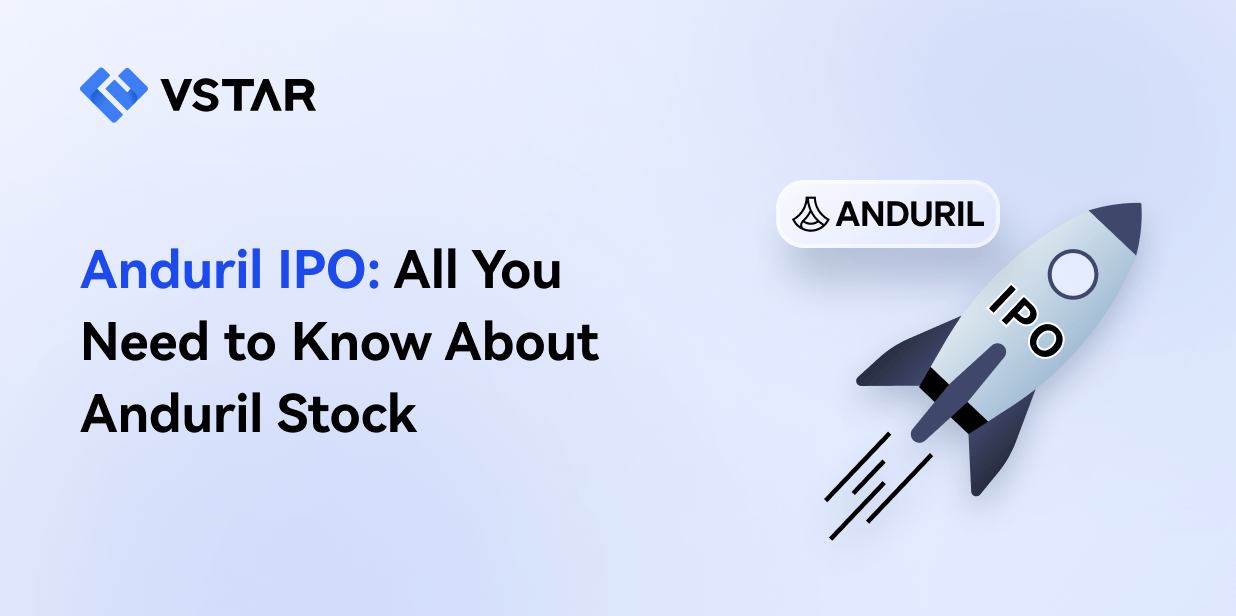Lucid Motors is one of the world's most promising electric vehicle (EV) companies. The company aims to deliver luxury EVs that combine performance, efficiency, and design. Lucid went public in July 2021 through a merger with a special purpose acquisition company (SPAC) called Churchill Capital Corp IV. The deal valued Lucid at $24 billion and gave it access to $4.4 billion in cash to fund its growth plans.
But here's the kicker: Lucid stock price has been on a roller coaster ride, fluctuating between $16 and $28 per share since then. The stock price reflects the market's expectations and sentiments about Lucid's prospects and challenges. For traders who want to profit from Lucid's volatility, tracking Lucid's stock price history is essential. It can help them identify patterns, trends, and opportunities to buy or sell Lucid CFDs.
Lucid Stock Price History
Lucid stock trades under the ticker symbol LCID on the Nasdaq exchange. As of May 2, 2023, Lucid had a market capitalization of $14.53 billion. The stock price closed at $7.32 per share on that day.
But wait, there's more. We can trace Lucid stock price history back to September 2019, when a SPAC called CCIV went public to merge with a private company. In January 2021, CCIV's share price surged after rumors of a merger with Lucid Motors, an EV maker founded by a former Tesla engineer. The merger was confirmed in February 2021, but the valuation was lower than expected, causing CCIV's share price to plummet.

The merger got completed on July 23, 2021, and CCIV's shares got converted into LCID shares at 1:1. LCID shares started trading on July 26, 2021, at $25.24 per share. Since then, Lucid stock price has been volatile, ranging from $16.12 to $57.75 per share.
Major Events and Lucid News Affecting Lucid Stock Price
Lucid stock price is affected by various events and news related to the company, the industry, and the market. Some of the major events and news that have affected Lucid's stock price are:

Production and Delivery Kick-Off
On September 28, 2021, Lucid announced that it had started production of its flagship EV model, the Lucid Air Dream Edition, at its factory in Arizona. The company also said that it would deliver the first batch of vehicles to customers in late October. The news boosted Lucid's stock price by more than 10% on the same day.
Record-Breaking EV Range and First Deliveries
On October 30, 2021, Lucid delivered its first Lucid Air Dream Edition vehicles to customers at a special event in California. The company also revealed that the Lucid Air car had achieved an EPA-rated range of 520 miles on a single charge, making it the longest-range EV in the world. The news lifted Lucid's stock price by more than 6% on the same day.

Net Loss and No Revenue
On November 15, 2021, Lucid reported its third-quarter financial results, which showed a net loss of $156 million and no revenue. The news caused Lucid's stock price to drop by more than 8% on the same day.
Strategic Partnership with Saudi Aramco
On May 19, 2022, Lucid announced that it had entered into a strategic partnership with Saudi Aramco, the world's largest oil company and Lucid's largest shareholder. The partnership aims to explore opportunities for collaboration in areas such as energy storage systems, carbon capture technologies, and sustainable mobility solutions. The news pushed Lucid's stock price up by more than 5% on the same day.
Comparison With Other Stocks in the Same Industry or Market

Lucid stock price can also get compared with stocks in the same industry or market to assess its relative performance and valuation. Some of the main competitors and peers of Lucid are:
Tesla (TSLA)
Tesla is the leading EV maker in the world, with a market capitalization of $507.09 billion and revenue of $81.462 billion in 2022. Tesla delivered 1.3 million vehicles in the same period and expects to deliver 1.8 million vehicles in 2023. As of May 2, 2023, Tesla's stock price is $161.83.
Nio (NIO)
Nio is a Chinese EV maker focusing on premium models. Nio had a market capitalization of $13.05 billion and revenue of $7.1 billion in 2022. Nio delivered 122,486 vehicles in the same period and expects to deliver more than 200,000 vehicles in 2023. Nio stock price currently stands at $7.81.
Rivian (RIVN)
Rivian is a US-based EV maker that specializes in electric trucks and SUVs. Rivian went public in November 2021, raising $11.9 billion and valuing the company at $66 billion. Rivian reported $1.658 billion in revenue in 2022, delivering 20,332 vehicles. Rivian's stock price as of May 2, 2023, is $12.65.
Based on these comparisons, Lucid stock price has a high growth potential and a high valuation. Lucid's market capitalization is higher than Nio's and Rivian's, despite having no revenues or earnings yet. Lucid's stock price is also more volatile than Tesla's and Nio's, reflecting the uncertainty and speculation around its prospects and challenges.
What Are the Characteristics of Lucid Stock Price?

Volatile
Lucid stock price is highly volatile due to its newness and competitive industry, influenced by factors like market sentiment and news. Volatility offers opportunities for traders to capitalize on price fluctuations.
Active
Lucid stock is active with high trading volume and liquidity, reflecting high interest and demand. This makes it easier for traders to enter and exit positions without affecting the market price too much.
Trending
Lucid stock price follows trends over time, which can be analyzed using tools like moving averages and chart patterns. Trending stocks are easier to trade as traders can follow the market direction and momentum.
Responsive
Lucid stock price reacts to stimuli such as news, events, and product launches, affecting its fundamentals and prospects. Traders can use various information sources to stay up to date, taking advantage of market reactions and movements.
What Factors Drive the Price of Lucid Stock Today?

Lucid stock price today is driven by a combination of factors that affect the supply and demand of Lucid shares in the market. We can categorize these factors into four main groups: economic conditions, industry trends, government policies, and company performance and news.
Economic Conditions
Economic conditions affect LCID stock price, including GDP, inflation, and interest rates. A higher GDP reflects a stronger economy and increased demand for goods like EVs, while a lower GDP signals a weaker economy and reduced demand. High inflation lowers consumer purchasing power and demand for discretionary goods like EVs, whereas low inflation increases demand. Higher interest rates raise borrowing costs and decrease spending on goods like EVs, while lower rates boost spending and investment.
Industry Trends
Industry trends in the EV market, such as competition, technological developments, and investor sentiment, impact LCID stock price. The high competition challenges Lucid's market share and margins, while low competition benefits them. Advanced technological developments enhance Lucid's product features and customer satisfaction, while limited innovations hinder them. Positive investor sentiment boosts Lucid's stock price, while negative sentiment lowers it.
Government Policies
Government policies impact the electric vehicle (EV) industry and LCID stock price through factors like tax credits, emissions standards, and infrastructure support. Higher tax credits make EVs more affordable, increasing demand for Lucid's products, while lower credits decrease demand. Stricter emissions standards raise the demand for Lucid's EVs, while looser standards reduce it. Better infrastructure support, such as charging stations, makes EVs more convenient, increasing demand for Lucid's products, whereas weaker support decreases it.
Company Performance and News
Company performance and news, including financial performance, corporate governance, and production capacity, impact LCID stock price. Strong financial performance and earnings reports signal profitability and growth, boosting the stock price. Effective corporate governance and management enhance the company's direction and quality, increasing the stock price. High production capacity and expansion efforts reflect Lucid's scalability and potential, positively affecting its stock price. Conversely, weak performance in these areas can decrease the stock price.
LCID Stock Forecast
Will lucid stock go up? LCID stock price prediction for 2023 and 2025 as shown bellow:
Lucid stock price prediction 2023
The near-term outlook for Lucid Motors stock in 2023 is cautiously optimistic. LCID is expected to ramp up production and deliveries of its Lucid Air luxury EV, with consensus estimates of around 10,000 vehicles in 2023. This is a significant ramp-up from the roughly 7,000 vehicles expected in 2022. Lucid has guided for revenues between $1.5 billion and $2 billion in 2023. Profitability is not expected until later in 2023 or 2024 as Lucid invests heavily in growth. Risks include production ramp challenges, margin pressure from high costs, and weaker demand if the economy weakens. However, Lucid's strong brand, $6 billion in cash, and Saudi backing provide stability. The average price target for LCID stock in 2023 is around $25.
Lucid stock price prediction 2025
Looking out to 2025, if Lucid can execute on its growth plans, the long-term forecast is very positive. Lucid has projected production capacity of 250,000 vehicles in 2026. Morgan Stanley forecasts a tenfold increase in revenues from approximately $2 billion in 2023 to over $22 billion in 2025. This includes expanded model launches such as the Gravity SUV. Profitability is expected by 2025, with the potential for strong cash flow as capacity expands. However, competition in the luxury EV space will intensify. If Lucid can hit its growth and production targets, its 2025 valuation could be justified in the $40-$60 per share range. But execution risks remain high for the nascent EV maker.
What To Learn From Lucid Stock History and How To Profit From Lucid

Lucid stock history can teach us several lessons and insights that can help us make better trading decisions and get profit from Lucid. Some of these lessons and insights are:
Is Lucid a good stock to buy?
Pros and Cons of Investing in Lucid Stock including:
Volatility Creates Opportunities for Traders
Lucid's volatility is ideal for active traders who use strategies to capitalize on the momentum and anticipate price changes. Traders can use technical analysis, indicators, and signals to identify entry and exit points and risk-reward ratios. Traders can also use leverage, stop-loss orders, and hedging techniques to enhance their returns and limit losses.
However, volatility also entails risk and uncertainty for traders. Here's why: they may face sudden and unexpected price movements that can wipe out their profits or cause losses. Traders must discipline themselves, be cautious, and be adaptable to cope with Lucid's volatility.
Growth Potential Attracts Investors
Lucid's growth potential is attractive for long-term investors who believe in the company's vision and prospects. But what does that mean? Investors can benefit from Lucid's innovation, differentiation, and expansion in the EV industry, which can increase its market share, revenue, and profitability in the future. They can also benefit from Lucid's brand recognition, customer loyalty, and reputation in the EV industry, which can increase its valuation and stock price in the future.
However, growth potential also involves challenges and competition for Lucid. Here's what they are: Lucid may face technical difficulties, production delays, regulatory hurdles, or market saturation that could slow its growth or even cause losses. That's why investors need to be patient, realistic, and diversified to cope with Lucid's growth potential.
Lucid Stock Investment Strategies for Traders
Long-term holding vs. short-term trading
Traders can opt for long-term holding (suitable for bullish outlooks and capital appreciation) or short-term trading (neutral/bearish outlooks and income generation) based on their goals, risk appetite, and preferences.
Investing or trading CFDs
Traders can either invest in Lucid stock (optimistic outlook, ownership rights) or trade CFDs (neutral/bearish outlook, flexibility, and leverage) based on objectives, risk tolerance, and preferences.
Analyzing stock price history, industry/market trends, financial statements, and news
Traders can use these sources to make informed decisions about Lucid stock, assess opportunities and threats, evaluate profitability and growth, and monitor corporate governance.
Diversifying investment portfolios
Traders can reduce risk and enhance returns by allocating funds across various assets, sectors, markets, and strategies with low or negative correlation. Diversification can be possible by investing in different financial instruments and employing various trading strategies.
How to Trade Lucid Stock CFD with VSTAR?

VSTAR is a global online trading platform that offers access to over 1000 markets, including FX, CFD indices, CFD US stocks, CFD HK stocks, crypto and commodities. But that's not all: VSTAR provides traders with an institutional-level trading experience, low trading fees, deep liquidity, and reliable order execution. VSTAR is also regulated and secure, authorized by the Cyprus Securities and Exchange Commission (CySEC) and a member of the Cyprus Investor Compensation Fund. And here's the best part: VSTAR has a user-friendly app suitable for both pro traders and beginners, with features such as an easy-to-use interface, minimum deposit from only $50, lowest trading cost, negative balance protection, real-time popular markets, and risk-free demo accounts.
Learn the Difference Between Investing and Trading
Investing and trading offer different approaches to making money in the financial markets. But what are they? Investing, typically a long-term strategy, involves buying and holding assets, such as Lucid stock (LCID) on the Nasdaq exchange, for years or decades with the expectation that their value will appreciate over time. This approach requires a higher initial capital and opening a brokerage account to trade US stocks. It also exposes investors to the risk of losing their principal if the stock price declines.
On the other hand, trading focuses on profiting from short-term price fluctuations, often within days or weeks. But how does it work? Trading Lucid CFDs involves buying and selling contracts for difference (CFDs) on LCID stock with a broker like VSTAR, allowing traders to speculate on price movements without owning the underlying asset. This method requires a lower initial capital and doesn't necessitate a brokerage account for trading US stocks. However, traders risk losing more than their margin if the price moves against them.
Going Long or Short on Lucid CFD
When going long on Lucid stock CFDs with VSTAR, traders buy CFDs expecting the price of LCID to rise. For instance, a trader who believes Lucid Motors will report strong earnings and increase production capacity might buy 1000 Lucid CFDs at $40 per share. They pay a margin of $4000 and use 10:1 leverage. If the LCID stock price rises to $50 per share after a month, the trader closes the position and makes a 250% return on the margin ($10,000 / $4000).
On the other hand, going short on Lucid stock CFDs means selling CFDs with VSTAR, expecting the LCID stock price to fall. If a trader thinks Lucid Motors will face competition and regulatory hurdles, they might sell 1000 Lucid CFDs at $40 per share, paying a margin of $4000 and using 10:1 leverage. If the price drops to $30 per share after a month, the trader closes the position and makes a 250% return on the margin ($10,000 / $4000).
Practice With a VSTAR Demo Account Before Investing Real Money


Before trading Lucid stock CFDs with real money, practicing with a VSTAR demo account is advisable. VSTAR demo account allows traders to trade LCID stock CFDs with virtual money and experience real market conditions. Traders can use the VSTAR demo account to test their trading strategies, learn how to use the trading platform, and familiarize themselves with the features and tools of VSTAR. VSTAR demo account is free and easy to open, and traders can access it anytime and anywhere.
Build Your Trading Strategy About Lucid
To successfully trade Lucid stock CFDs, traders need a well-defined strategy that aligns with their goals, risk appetite, and trading style. This strategy should include a trading plan for focus, discipline, and accountability; a trading system utilizing technical and/or fundamental analysis for identifying opportunities and managing trades; and a strong trading psychology to overcome emotions, biases, and stress impacting trading performance.
Risk Management
Risk management is crucial when trading LCID stock CFDs with VSTAR, as it helps traders protect their capital, limit losses, and maximize profits. Key risk management tools include stop-loss orders to automatically close trades at a predetermined loss level, take profit orders to lock in profits at a specified level, position sizing to balance risk and reward based on risk tolerance and account size, and diversification to spread risk across various markets, assets, or strategies, reducing dependence on a single income source and increasing success chances.
Why Trade Lucid CFD with VSTAR?
VSTAR is an ideal platform for trading Lucid stock CFDs due to its low trading fees, deep liquidity, global regulation, user-friendly app, a low minimum deposit of $50, and cost-efficient trading. Additionally, VSTAR provides negative balance protection and real-time market updates, ensuring that traders can confidently and conveniently trade LCID stock CFDs with limited risk and seize opportunities.
Conclusion
Lucid Motors, a luxury electric vehicle company, went public in 2021 through a merger with Churchill Capital Corp IV, trading as LCID on Nasdaq. Traders interested in Lucid Motors can trade Lucid stock CFDs on VSTAR. To trade LCID stock CFDs successfully, traders need a clear strategy, practice with a demo account, and utilize risk management tools. VSTAR enables traders to capitalize on Lucid stock's volatility, liquidity, and growth potential through its low-cost, high-quality platform.
FAQs
1. Who owns the most Lcid stock?
The largest institutional shareholder of LCID is the Public Investment Fund of Saudi Arabia, which owns over 60 million shares.
2. Is Lucid Motors a Buy, Sell or Hold?
The consensus among analysts is currently to hold LCID stock. Morgan Stanley recently set a price target of $12, Citi has a sell rating and a $23 target, while Bank of America has a buy rating and a $35 target.
3. What is a good price for Lucid stock?
A good price for LCID stock depends on one's investment timeframe and risk tolerance. Based on forecasts, a price between $20 and $30 may be reasonable.
4. What is a fair price for Lucid stock?
A fair valuation for LCID stock is difficult to determine as it is an early stage EV company. Its current market cap of approximately $30 billion implies an enterprise value to 2025 of approximately 10x forward sales, according to Morgan Stanley estimates. This takes into account significant growth from around $2B in 2023 to over $22B in 2025 revenue.
5. Is Lucid stock undervalued?
LCID's current valuation of around $30B is controversial. Bulls argue that it is undervalued given its rapid growth projections, while bears point to execution risks and competition. LCID trades at a higher 2025 EV/revenue multiple than peers like Rivian (4-5x) and NIO (2-3x) based on Morgan Stanley data. However, LCID is projected to grow faster.
6. What is the Lucid stock price prediction 2025?
Lucid stock forecast for 2025 range widely from $10 to over $100 per share, highlighting the uncertainty in LCID's future outlook. Most estimates are in the $40-$60 range.


















